- Home
- Tim Winton
Eyrie Page 2
Eyrie Read online
Page 2
The lift was mercifully empty. He travelled unseen and uninterrupted to the ground floor. Let the lobby doors roll back. Took it full in the face. All that hideous light. Walked out like a halfwit into a bushfire.
He didn’t even know where he was headed. Discovered himself walking the wrong way, for one thing. It was hot enough to kill an asbestos sparrow. The concrete forecourt livid, the street branding, blinding, breath-sucking. Acid light plashed white underfoot, swashing wall to wall, window upon window, and he waded in it a moment, tilting spastic and helpless, so suddenly porous and chalky it was all behind his eyes in an instant, fizzing within his skull until it rendered everything outside him in flashes and flickers. No gentling tones out here, only abyssal shadows or colours so saturated they looked carcinogenic. Keely glimpsed, gasped, fought off the dread and gimped on gamely, but he didn’t see the bodies on the pavement outside the Chinese joint until he’d almost trampled them.
A girl hunkered in the busy foot-traffic beneath an audience of women who bickered with such conviction they had to be relatives. All of them fat and angry, red-faced, sniping. The girl herself was changing a baby’s nappy in the street; a hot, shrieking girl-child on the bare concrete. And as he pulled up, sculling a moment, disoriented as much as obstructed, he felt the clan stiffen, saw them scowl as if preparing to fend him off. He hesitated, sought a course around them, as the oldest, a stout and ugly woman, bunched a Kmart bag and shoved it beneath the infant’s head. In nearly the same moment the squatting mother shot a glance upwards that seemed directed solely at him. It may only have been a glance of shame or even defiance but to Keely it felt like hatred and he turned aside as if struck.
He angled away into an oncoming torrent of pedestrians, all boiled faces and beetling sunglasses, a surge of elbows, phones, smoke-puckers and semi-syllables within a fug of sweat and warring perfumes. He yielded towards the road’s edge where buses shuddered and gulped at the kerb. A skateboarder swept past. The street pulsed and roared as he fought for a bearing. Target, pharmacy, real estate agent, bank. Fuck, he was listing, yawing, hopelessly self-correcting. It was more than he could manage. Any second he’d capsize.
So he lurched into the closest entry. Coles. Safe harbour. Obedient glass doors, air-conditioning, Muzak. Went deep, headed instinctively for the fluorescent headwaters, seeking cool air and cooler still, until he found himself in the produce section, staring at spears of Peruvian asparagus in slender, uniform lines of pale green. They were only cut vegetables, for Christ’s sake, and cheap imports at that, but there was something lovely and clement about their serried ranks and pastel colour, and now that he noticed it, the entire refrigerated colonnade had over it a misty sheen cool enough to make a Celt weep. Moist, clean, unending blur. Beneath the Muzak, a special kind of quiet. Silent gusts of respite. And such calm, such unpeopled order. He caught himself fighting the urge to lie down there in the lee of these wafting cabinets and sleep till dark. Just him and poor Karen Carpenter. Him and the clean pine crates and the Pine O Cleen disinfectant and those vegetables to which clung the last faint odour of something like life itself. He imagined it, thought better of it, then discovered himself on the lino, being stood over by a woman with spectacles and brown fists. She seemed distressed, even angry, but she was being perturbed in a language he didn’t speak yet. She pointed at him excitedly, bleating and toothbaring a little before she began to hammer with some emphasis at the steel cradle of the impressive tomato display. But his cheek was cool against the floor and he couldn’t quite feel the immediacy of her concern. And then she was yanking at him without fear or favour, and he was on his feet, alone.
Maybe this was what it was like to die a little, to feel shriven, rescued, redeemed. Having your collar pulled, your fucking beard tugged by the roots until there you were, upright and guiltless, watching your irritated saviour scuff away in Third World footwear, pushing a loaded trolley.
Becalmed. Adrift. Summoning a bit of puff.
He ghosted through the aisles accompanied by the sad, sweet Carpenters – who he hoped were now both safely dead. For his peace of mind. For their own good.
Finally, for the sake of propriety, to feel in charge of himself once more, he made a few purchases. The steadying force of retail.
This. This. That, whatever it was. Couldn’t afford any but he bought them all.
Going through the motions at the checkout helped a little, but it occurred to him – winked like an oil light on the dash – that he really could be losing his mind. And that couldn’t be all his fault. Surely.
The change. Which he accepted graciously. Along with the girl’s limp smile of boredom.
And there he was, successfully transacted, having paid dearly for his little digression, his minutes of stunned mullethood, hoisting this clammy bag of unnecessaries, suddenly aware again of how eerily hungry he was and why he’d ventured out in the first place.
He craved a couple of Bub’s fluffy double-shots. But he’d never make it to the Strip. He lacked the loins, pure and simple. Only a trek of three hundred metres or so, but out of range today. He was rogered. Unless he chanced his arm somewhere here in the refrigerated mini-mall. There was a nook of sorts beside the Cut and Blow. Yes, here it was. With malarial bain-marie and plastic tables. Open to the polished concourse, so the Muzak was free and endless, and the smells of burning cheese and scorched hair roiled like confluences about the vinyl palm tree separating the two establishments. What the hell. Time to experiment. Necessity being the motherfucker of whatever is in its way.
Took a little round table. Pressed his thumbs, like his very own executioner, to his temples. Ordered something that sounded safe enough. And took stock.
Usually – on his standard wasted day – he’d walk an hour, take a swim, lounge at Bub’s and dodge certain faces by judicious use of the menu or a reiki tract left by some wide-eyed chump. All the while convincing himself that despite appearances his days retained a certain functional coherence. That was an effort, and today such feats were beyond him. He felt peeled, without defences. He was not himself, not even the remnant self he’d been yesterday afternoon. Maybe it was just the bad start. The nasty fright. Which, of course, would turn out to have a simple explanation. But the town felt hostile this morning and the world past its modest boundaries without pity. He could feel it pressing hot and breathless against the glass doors in the distance. Or perhaps that was just weather.
Besides, it was pension day. The fortnightly full moon. Twelve hours of tidal chaos. So if he really wanted to press on further from home in search of better fare and more congenial surrounds, then he’d have to run the payday gauntlet between this little granny mall and Bub’s. And that was a lot of crazy shit to get through. For that you needed skin. Ramrod will. And funds. Because before you even got to the corner there were toothless winos and humbugging Aborigines, each with a case to make and a cloud of misery and body odour to drive it home. Once you’d fought your way clear of the bottlo and the junkie park, you’d need to penetrate the phalanx of charity-tin rattlers skulking soulfully in the trinket alleys and shady arcades. And what could you do but honour their efforts, sign their petitions, fork out the shekels while seething? He gave bogus addresses, snail and email, and hated himself for it. Their causes were just but doomed.
Thank God they were all so fresh and endlessly replaceable, these kids, because they almost never recognized him. What could you tell them, these smiley elves from Oxfam, Greenpeace, or Friends of the Forest, what could you honestly say? It killed you, the bright-eyed marsupial innocence of their faces. No. No sir. Not today.
And even if he did make it that far without falling over again or yacking on someone, he’d still have the buskers to deal with. They were worse than any charity picket, more offensive and evil-smelling than any derro or waistcoated do-gooder. These talentless nitwits were the final obstacle between you and a fistful of arabica beans. And by the time you reached them you were already punch-drunk and desperate. Without discrimi
nation or pride. So there you went, most days, creeping past the tattoo dens and incense emporia where they lurked, steeling yourself to stride by solemnly but almost always ending up shelling out like a man envious of the higher gifts. Just to get by, just to be left alone, just because you felt sorry for the same three chords about the usual damage done.
After all that he’d finally totter onto the little avenue of self-congratulation that everyone called the Cappuccino Strip. Fifty umbrellas around which a certain civic pride once rallied. In the seventies the Strip had been a beacon of homely cosmopolitanism, a refuge from the desolate franchise dispensation stretching from sea to hazy hills. But that was before it calcified into smugness. Somewhere along the way the good folks of the port settled in the wisdom that coffee was all the culture and industry a town required. Butcher shops, hardware stores, chandlers and bakeries had steadily been squeezed out and surplanted by yet more cafés, new spaghetti barns. Rents were extortionate, house prices absurd. The city had become a boho theme park perched on a real estate bubble, and behind every neglected goldrush façade and vacant shopfront was a slum landlord counting pennies, lording it over family and bitching about refugees.
Freo, mon amour. It gave him five kinds of sulphuric reflux to think of it. Didn’t know how he could still love it so. Tried to tell himself at least it wasn’t Perth, that pastel toy town upriver. But Christ, that wasn’t saying much, was it?
No, this sad little caff would have to be it today. He was physically infirm and psychically unable to go any further. He’d sit tight and watch the trolley-boys trundle by, the parched oldsters wheezing in from Centrelink and Culley’s on their walkers, the rat-tailed infants chucking tantrums on the shiny tiles. He could bear this. Couldn’t he? He was here already, he’d made his order. He was all set. And yet he could not rest. For the mind charged on, cataloguing the horrors he’d spared himself. The manky footpath jewellers, the already drunk Irish backpackers, the mouthy schoolkids.
Still, when he beheld his breakfast on its sunny yellow plate, his resolve began to decay. He couldn’t help but think of properly fried bacon, of hash browns and fluffy free-rangers, of a coffee upon whose bronzed crema a spoonful of sugar might wallow, like a cherub upon a cloud. As he struggled with some aberrant species of ham-and-cheese croissant that clung to his gums like denture glue, he began to wonder if he might just man up after all and make a dash to Bub’s. Well, perhaps not a dash. A power shuffle, a wilful creep.
Hell, yes. And he was bracing against the sticky plastic in preparation for a slow-motion getaway when he remembered the time. It was witching hour on the Strip. That meant yummy mummies. Über-matrons. He couldn’t abide them. Or resist them. They’d see him off in a heartbeat. Without even noticing him. Without registering his feeble presence. With their hulking all-terrain strollers and jogging sheen, their kooky ethnic headscarves and gleaming thighs, they were enough to make a man kick a Buddhist. Late morning they ran in packs, descending upon the quarter to circle their wagons and colonize entire cafés for cistern-sized lattes and teeny-cutesy babycinos. There was something loathsome and luscious about their fruity chirrups, their sweet-smelling sweat, their mist of satisfaction. Not content to be healthy and handsome, they had to be cruelly ravishing. And Jesus, even Leni Riefenstahl had spared us Lycra.
Keely’s contempt and lust were no match for them. Which was why he usually went early. To save himself the suffering. So that was that. Here he stood. Sat. Wrestling his greasy bolus. Sipping this bituminous brew. Having barely gotten change from a tenner. Let no man say he didn’t keep an open mind.
Nothing for it but to suck it up and beat a ginger retreat.
Home was only forty metres away, sixty at the most. But something of a challenge given the blurred vision and the intermittent sparks of lightning in his head. Twice he needed to steady himself. First against a jacaranda. Then by high-tackling a molten parking meter. And in these restorative pauses he leant back like a tranquilized pole-dancer to take in the brutal monolith that rose above trees, chimneys and whining wires.
The Mirador. Not much of the winsome Spanish turret about it, that’s for sure. It was a classic shitbox: beige bricks, raw concrete galleries, ironbar railings, doors and windows like prison slots. Hard to credit that fifty years ago some nabob thought it a grand idea, a harbinger of progress. The place had grown old and grim within months of its completion and the subsequent years had not been gentle. Locals despised it. But it had been a haven for old folks, retired lumpers and clerks, invalid pensioners, transients, drunks and welfare mothers. They were still there, many of them, lately joined by the first gentrifying hopefuls and middle-class casualties like himself. Keely looked up at its meagre balconies. The drying mop, the ruined telly, the Dockers flag, the jaunty sunflower in a pot, the wheelchair flashing in the sun.
He swayed against the meter and felt a little flutter of affection for the old hulk. Like him, the building was a product of the sixties. And like him it was too large a mistake to be undone.
I’m not much, he told himself on the caustic forecourt, but I’m home.
The lobby stank of laundry soap, fresh paint, and mopped floors. As he entered, Keely fell in behind a woman and child heading for the lifts. He would have preferred to peel off into the laundromat a moment until they were gone, and then go on up alone when the coast was clear, but he was desperate to lie down; he felt faint and the headache was evil in him. Besides, the lift door rolled open as he approached; he’d only look like a wally backing away now. So he followed them in, careful to arrange himself and his morally unflattering plastic bag in the farthest corner of the carriage. When the woman punched the key for the tenth floor his heart sank.
You? she asked without looking his way.
Oh, he murmured. Same.
Neighbours, then, she said with a hint of scepticism.
He grunted. She sighed as if she’d already discounted his presence.
Keely snatched a look at the boy as he laid his head against the woman’s hip. The kid avoided his gaze. As they were hauled up slowly Keely fixed on the woozy stippled pattern of the car’s stainless-steel lining.
No good? the woman asked the boy.
I’m not right in myself, said the kid.
Did you sick up? The teacher didn’t say.
No, said the boy. But I’m not well.
You’re hot.
Yes, hot in the temperature.
The woman made a gentle laughing sound through her nose and repeated it without mockery: Hot in the temperature.
Keely sensed the pale flare of the woman’s face turning his way.
When he was really little, she said, he thought his forrid was his temperature. You know, let me check your temperature and everythin. Little smartarse.
Am not.
Are so.
Keely assembled a makeshift grin but spared himself the eye contact. There he was in monstrous outline, distorted by the shiny pressed steel, radiating fluorescent light from a hundred welts and dints. When he moved, his head swam. God, he thought, all the stoners in the building – do they take the stairs?
He dug a thumb into his temple, closed his eyes.
And now, she said. Now, he’s not right in himself.
Well, said the boy. I’m not.
You never get crook of a weekend, do ya?
I was once.
That was Easter, you dill. All that chocolate. Eyes bigger’n yer belly.
He felt the woman’s attention, the full force of her gaze. It was all he could do not to cringe. Inside his shirt the sweat began to run; he could feel panic rising in him like nausea and only the bounce of their arrival delivered him. As the door opened he lunged forward, hoisting his clammy supermarket bag after him, and took in a hot draught of air. Out on the walkway he stepped aside so they could pass, and the woman brushed by smelling of cigarettes and body spray. But the boy lingered. And when Keely looked back he saw him planted in the gap, fending the closing door off with hip and shoulder like
a little half-back. His gaze was intense but removed and without the boy actually looking his way Keely sensed himself being registered, sized up. And it was awkward. Standing there, suspended. The woman waiting beside him with no pretence at patience. As if she blamed him as much as the kid for this delay.
Keely prepared to walk away but there was something about the boy that intrigued him. Perhaps the dark rings beneath his eyes. Or the pale blue irises. Such a round face. And they did something odd, those shadows, made the kid seem older than he was, older than he could be. His hair fell white and straight to his shoulders. He licked his lower lip, which was chapped, and bunted the door away again as the woman jangled her keys. The boy wore a little polo shirt, shorts, sneakers. Just an ordinary Mirador kid trying it on with his long-suffering mother. So what was it that made Keely’s stomach flip, standing here watching him gaze across the rooftops while the hot wind rose from the shaft at their feet? He had no experience with kids; he didn’t know what this was. But it felt a bit like being cased by a dog too wary to come right up and sniff.
When you’re ready, said the woman.
I’m ready, said the kid, stepping out, letting the door roll to.

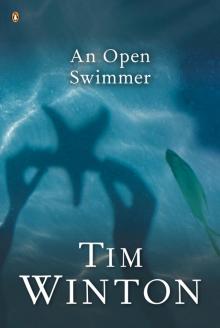 An Open Swimmer
An Open Swimmer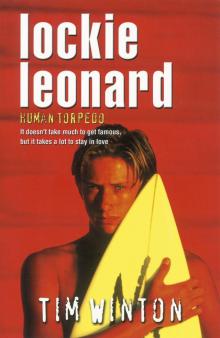 Human Torpedo
Human Torpedo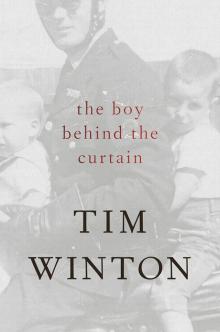 The Boy Behind the Curtain
The Boy Behind the Curtain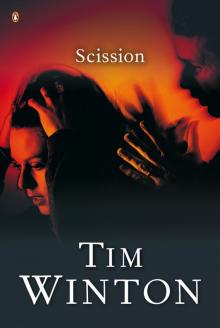 Scission
Scission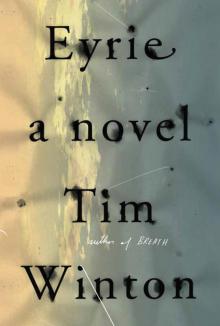 Eyrie
Eyrie Island Home
Island Home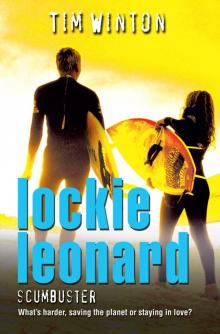 Scumbuster
Scumbuster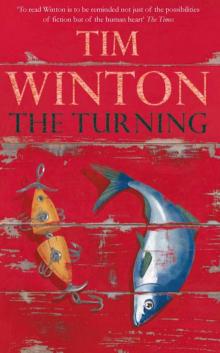 The Turning
The Turning Legend
Legend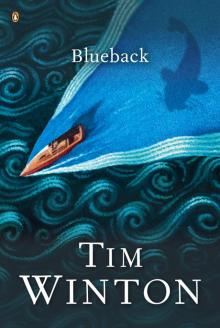 Blueback
Blueback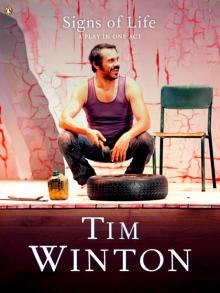 Signs of Life
Signs of Life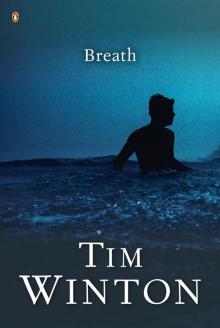 Breath
Breath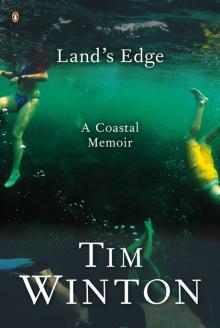 Land's Edge
Land's Edge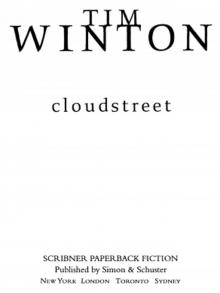 Cloudstreet
Cloudstreet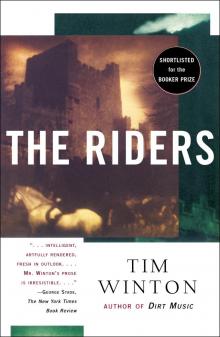 The Riders
The Riders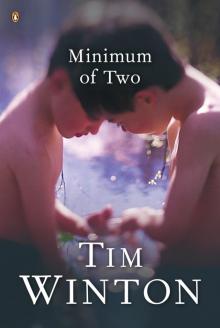 Minimum of Two
Minimum of Two Shallows
Shallows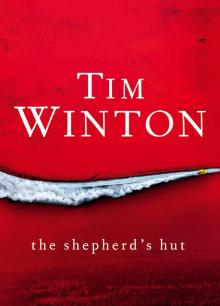 The Shepherd's Hut
The Shepherd's Hut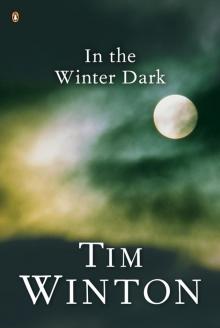 In the Winter Dark
In the Winter Dark